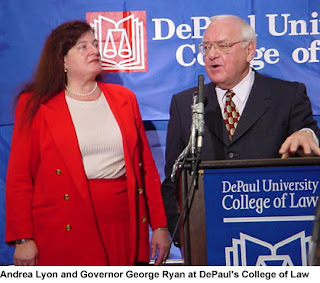
ILLINOIS:
'Chicago Tribune' Comes Out Against Death Penalty -- And Few Protest
For several years now, the Chicago Tribune has published numerous articles
-- many of them award-winning -- exposing the many faults in the
administration of capital punishment in its home state and the nation.
Some of them helped inspire a moratorium on the death penalty in Illinois.
All the while, the paper's editorial page continued to support capital
punishment. That changed 3 weeks ago with an editorial opposing the death
penalty. Relatively few newspapers have gone that far and public opinion
continues to back capital punishment -- although support drops when people
are given the option of "life without parole."
Today, the Tribune's public editor, Timothy McNulty, reports that his
paper's surprise editorial has drawn surprisingly little black from
readers. Here is the 1st part of his column.
**
Individuals change their minds often, but a change of mind for a
newspaper's editorial position, especially one that has stood since at
least 1869, is far less common.
When the Tribune's editorial board came out in opposition to the death
penalty three weeks ago, the newspaper might have expected a rise out of
readers and politicians previously aligned with traditional thinking that
favored capital punishment.
"The evidence of recent years argues that it is necessary to curb the
government's power," the editorial declared, overturning its previous
arguments. "It is time to abolish the death penalty."
There was barely a ripple, a few heartfelt letters to the editor, a few
calls, and almost all accepting and welcoming the new attitude.
Abolition of the death penalty isn't on the political radar at the moment,
and if any readers were surprised, they may have assumed the newspaper
already opposed the death penalty. 8 years ago, reporters Maurice Possley,
Steve Mills and Ken Armstrong began detailing the abuses, and their
reporting led then-Gov. George Ryan to impose a death-penalty moratorium
in 2000. Gov. Rod Blagojevich has maintained it since.
Tribune writers continue to lead on national stories about death-penalty
abuses. Cornelia Grumman, an editorial writer, won the Pulitzer Prize for
her series of editorials on the injustice of the death penalty.
While here and in other states the same arguments are put forward by both
sides of the debate, the Tribune's editorial board looked at them afresh,
but also with the overwhelming evidence that the death penalty is not
applied fairly and is too open to mistakes that cost innocent lives.
(source: Greg Mitchell (gmitchell@editorandpublisher.com) is editor. He is
co-author, with Robert Jay Lifton, of the book about capital punishment,
"Who Owns Death?", publihsed in 2000)

